Product Description
Sapphire Rx570 Nitro Plus 4GB,

Fan Check
With NITRO+ models, SAPPHIRE has upped the stakes with its new Fan Check, which allows users to check the cooler's status via SAPPHIRE TriXX 3.0 software, and contact customer support in case of problems.
NITRO Quick Connect
SAPPHIRE’s Quick Connect System provides a quick and easy solution. If there’s a fan issue detected, the user doesn’t need to return the entire card – SAPPHIRE’s partners will send out a replacement fan directly to the customer or the retailer. Please contact your place of purchase to request a fan replacement. SAPPHIRE’s channel partner will arrange the ideal solution for you to receive your replacement fan.
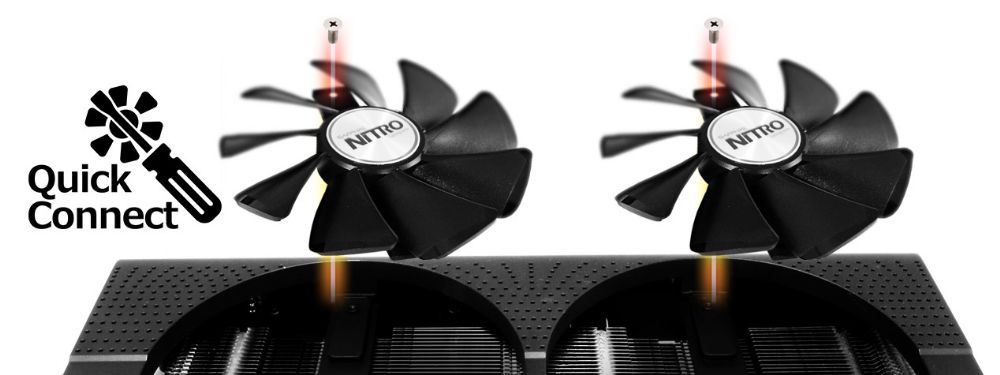
NITRO Glow

The graphics card is more than another component; it’s the beating heart of your gaming system. It should look as good as it costs. With tasteful shroud design augmented by RGB LEDs, each card is practically a piece of art. You can even change the colours of the LED, for your own customized design. This can be controlled via software using the latest version of SAPPHIRE’s Award Winning Overclocking Utility – TriXX 3.0, or through hardware by pressing the red button on the back of your SAPPHIRE NITRO Gaming Series card. Users can choose from a set of five different modes including Fan Speed Mode, PCB Temperature Mode or the colourful rainbow mode. If you prefer, LEDs can also be turned off.
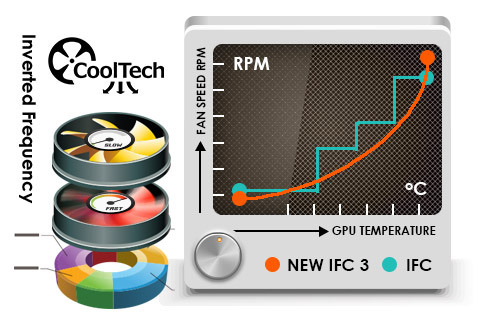
NITRO CoolTech
With the SAPPHIRE NITRO Gaming Series cards’ Intelligent Fan Control III, the fan starts precisely at 56 degrees Celsius to smartly balance performance against fan noise.

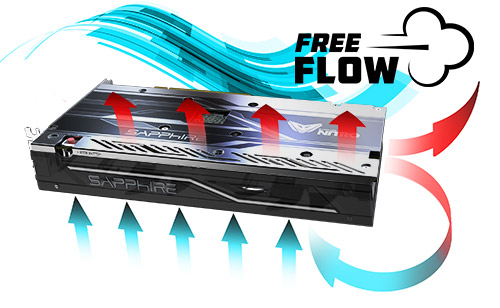 NITRO Free Flow
NITRO Free Flow
We looked at the traditional axial fan design system, and found that the way it circulates the hot air back to the fan inlet resulted in a higher temperature over time. With NITRO Free Flow (NFF) we redesigned the airflow of the entire cooler and board, so that the hot air is expelled through the system fan instead, rapidly dissipating heat.
 NITRO Boost
NITRO Boost
The new NITRO Boost switch increases the boost clock and power limit for higher performance to unleash the gaming performance of the card.
Planning to overclock or looking for maximum performance? SAPPHRE NITRO cards come with an 8 pin power connector to plug in and enable Nitro Boost.
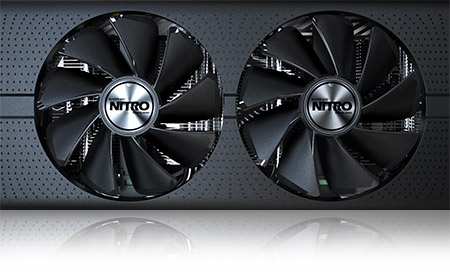 Dual-X Cooling
Dual-X Cooling
SAPPHIRE's acclaimed Dual-X Cooling is powered by two massive yet silent fans and state-of-the-art radiator design. The new form of our 95mm blades mean greater airflow and superior heatsink coverage at lower noise compared to standard cooling designs.
These feature dual ball bearing fans, which have an 85% longer lifespan than sleeve bearings in our tests.
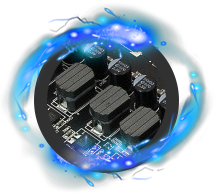 Black Diamond Chokes 4
Black Diamond Chokes 4
Our Black Diamond Chokes are 10% cooler and 25% more power efficient than a normal choke - and these Mark 4 Chokes reduce the coil temperatures by other 15% over the Mark 3s.
These exclusive chokes will maintain gaming stability using their built-in heatsinks and help minimize coil whine.
 VR Friendly
VR Friendly
The SAPPHIRE NITRO Gaming Series cards come with Dual HDMI ports, specifically designed to work with VR. By having two HDMI ports, you can have both an HD monitor and cutting-edge VR headset running at the same time.
The ports are HDMI 2.0b, the latest update, with an 18Gbps bandwidth, up to 32 audio channels, and is able to support 4K 50/60 resolutions like 2160P, whilst remaining entirely backwards compatible with older HDMI specifications.
Two-ball bearing
Dual ball bearings on the fan spindles ensure smooth running and long life and are designed to keep out dust. A quiet cooling solution, Two ball-bearing fan features a high-efficiency blade design.
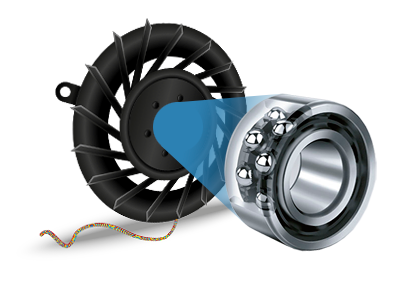
 Frame Rate Target Control
Frame Rate Target Control
Frame Rate Target Control (FRTC) enables users to set a target maximum frame rate when playing an application in full screen mode; the benefit being that FRTC can reduce GPU power consumption (great for games running at frame rates much higher than the display refresh rate) and therefore reduce heat generation and fan speeds/noise on the graphics card.
Frame Rate Target Control caps performance not only in 3D rendered in-game scenes, but also in splash screens, loading screens and menus, where frame rates can often run needlessly into the hundreds of FPS. Users might wish to set a very high cap just to limit wasteful FPS like that seen in menus and such, while still taking advantage of the responsiveness given by FPS well beyond 60.
DirectX® 12

DirectX® 12 is a new, “console-like” graphics API from Microsoft® that empowers game developers with more direct and obvious control of PC hardware. This direct or “explicit” control better exposes the hardware resources of AMD Radeon™ GPUs to yield higher hardware throughput and, ultimately, more performance for users. To put it simply: much more efficient hardware through smarter software! At the discretion of a game developer, this superior efficiency can be spent on higher framerates, lower latency (VR), lower power consumption, better image quality, or some calculated balance of all four. In any scenario, gamers stand to benefit greatly from choosing AMD hardware to run their favorite DirectX® 12 game.
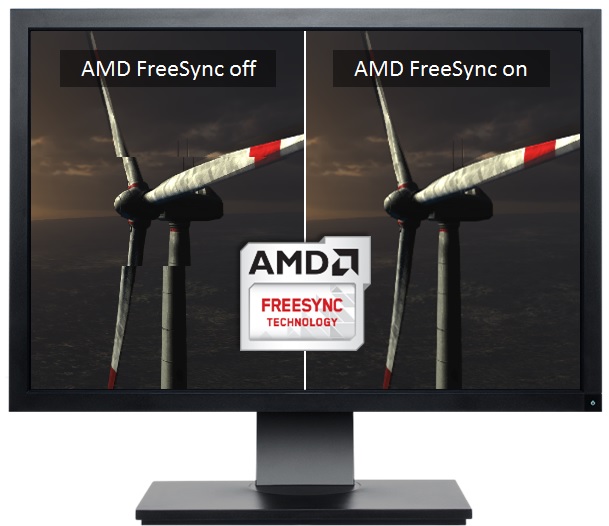
AMD Freesync technology
No stuttering. No tearing. Just gaming.
AMD FreeSync™ technology allows a compatible graphics card and monitor to dynamically change frame rates for the optimum display quality without tearing or stuay.
Industry-Standard Displayport
Freesync uses industry-standard displayport Adaptive-Sync Eliminates screen tearing without all the usual lag and latency
- Synchronizes the refresh rate of a compatible monitor to the frame rate of your content, however much it varies
- Monitor partners are validating with drivers from AMD now
 AMD XConnect™ Technology
AMD XConnect™ Technology
Plug in and game on with AMD XConnect technology.
Now it’s easier than ever to connect and use an external Radeon™ graphics card. With AMD XConnect™ technology, external GPU enclosures configured with Radeon™ Graphics can easily connect and disconnect to a compatible ultrathin notebook or 2-in 1 over Thunderbolt™ 3 at any time, just like a USB flash drive—a first for external GPUs!
AMD Eyefinity Technology
Multidisplay technology for gaming, productivity and entertainment
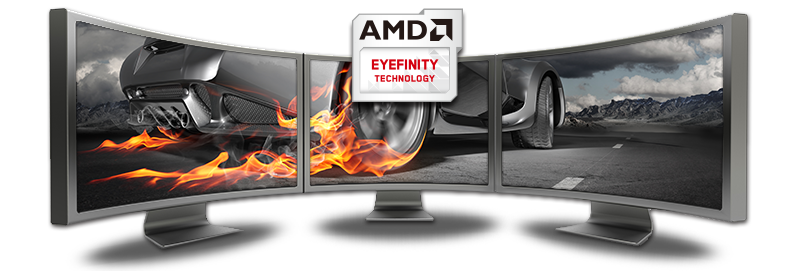
We are taking you beyond the boundaries of traditional PC displays. AMD Eyefinity technology expands the traditional limits of desktop computing by multiplying your screen area. With multiple monitors, games become more immersive, workstations become more useful and you become more productive (an average of 42% more productive according to one study).
Take your PC games to the next level of reality and immersion. Most modern games look great on three screens, and only AMD Radeon™ graphics offer you the ability to play across five screens for an eye-popping gaming experience. Other combinations and configurations with up to six screens work too.1 Create your dream display.
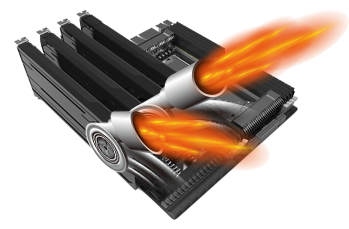 AMD Crossfire™
AMD Crossfire™
Harness the power of multiple GPUs
AMD CrossFire™ technology is the ultimate multi-GPU performance gaming platform. Unlocking game-dominating power, AMD CrossFire™ harnesses the power of two or more discrete graphics cards working in parallel to dramatically improve gaming performance.1 AMD CrossFire™ technology ready graphics cards fit practically every budget. With the flexibility to combine two, three or four GPUs, AMD CrossFire™ technology is the perfect solution for those who demand extreme performance.
Introducing AMD LiquidVR
LiquidVR™ is an AMD initiative dedicated to making VR as comfortable and realistic as possible by creating and maintaining what’s known as “presence” — a state of immersive awareness where situations, objects, or characters within the virtual world seem “real.” Guided by close collaboration with key technology partners in the ecosystem, LiquidVR™ uses AMD’s GPU software and hardware sub-systems to tackle the common issues and pitfalls of achieving presence, such as reducing motion-to-photon latency to less than 10 milliseconds. This is a crucial step in addressing the common discomforts, such as motion sickness, that may occur when you turn your head in a virtual world and it takes even a few milliseconds too long for a new perspective to be shown.
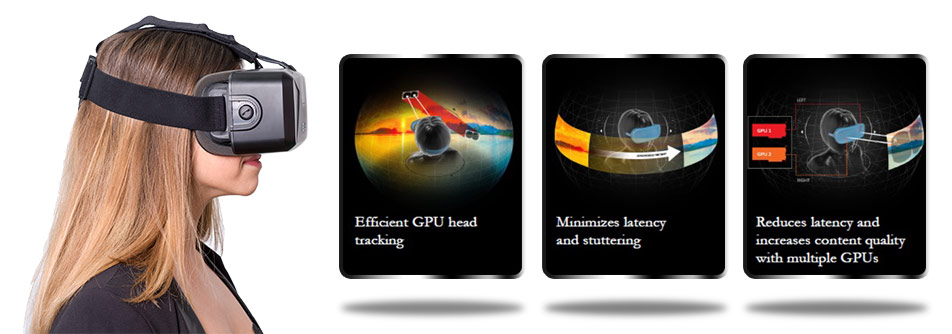
 Virtual Super Resolution
Virtual Super Resolution
Virtual Super Resolution (VSR) is an AMD feature that is game and engine agnostic to simulate Super-Sampling Anti-Aliasing (SSAA) in games that do not have native SSAA support. VSR can also be used in conjunction with other native in-game anti-aliasing for even more game graphics-setting control. VSR allows games to render at higher resolutions (up to 4K; see the ‘Virtual Super Resolution Support’ table, below) and then rescales them down to a lower native display resolution. Using this, you can get quality that rivals up to 4K, even on a 1080p display while playing your favorite games.
HDR Ready
High Dynamic Range (HDR) is a state-of-the-art technology for gamers and cinephiles that care deeply about the display quality of their TV or monitor. Modeled after the acuity of human vision, HDR vastly expands the range of colors and contrast ratios that can be shown by compatible displays. HDR-ready games and movies played on an HDR display appear strikingly sharp, colorful, and vivid, with enhanced contrast and sophisticated nuance compared to even the most stunning SDR content.
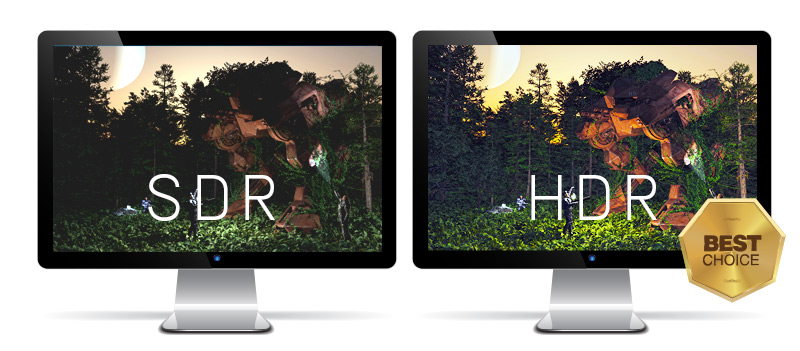
| GPU | 2048 Stream Processors 14 nm FinFET 4th Graphics Core Next (GCN) 1340 MHz Boost Engine Clock |
| Memory | 256 bit Memory Bus GDDR5 Memory Type 1750 MHz, 7000 MHz Effective 4 GB Size |
| BIOS Support | UEFI BIOS |
| Displays | Maximum 5 Outputs |
| Output | 1 x DVI-D 2 x HDMI 2 x DisplayPort 1.4 |
| Resolution | 5120×2880 (60Hz) Pixel DisplayPort Resolution 2560x1600 (60Hz) Pixel Dual Link DVI Resolution 4096x2160 (60Hz) HDMI Resolution |
| API | OpenGL® 4.5 OpenCL 2.0 DirectX® 12 Shader Model 5.0 |
| Feature | AMD CrossFire FreeSync Technology AMD Eyefinity Quad HD Display (4K*2K Support) Dual BIOS AMD Xconnect ready DirectX™ 12 Optimized HDR Ready Frame Rate Target Control NITRO Fan Check NITRO Quick Connect system NITRO Glow RGB LED NITRO CoolTech(NCT) Dual-X Cooling NITRO Boost Intelligent Fan Control III Black Diamond Choke 4 Fuse protection Precision fan control Robust VRM Cooling Radeon Chill Radeon Relive |
| Cooling | Dual-X fans Two ball bearing |
| Form Factor | 2 Part Slot Occupied 260(L)X 135(W)X 43 (H) Dimension /mm |
| Power Consumption | <195W |
| OS | Windows 10 Windows 7 |
| System Requirement | 500 Watt Power Supply (Suggestion) 1 x 8-pin AUX Power Connector 1 x 6-pin AUX Power Connector Blue-ray™ / HD DVD playback requires Blu-ray / HD DVD drive. PCI Express® 2.0 or higher version based PC is required with one X16 lane graphics slot available on the motherboard in order for the card to be compatible with. |
- Login
-
- Homeshopping
- Sort by Newest
-
- Newest
- Best
- Oldest

